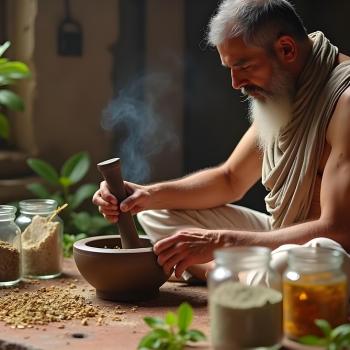A good father, in Luke's view, is one who doesn't just wait inside the manor house for you to come crawling back home, but who, throwing dignity to the winds, runs down the path to meet you with tears on his face. A good father, in Luke's view, is one who comes out to where you're lying in the ditch, beaten up by life, and picks you up, binds your wounds, and loves you into healing.
Maybe you've never known a father like that. Maybe you have. Will Willimon tells a story of a woman who worked in a drug and alcohol rehab center. She described her work to him: "We have all incoming residents fill out a questionnaire when they are admitted. One of the questions is ‘Describe your home life growing up in a brief paragraph.' Ninety percent of them start with these words: ‘I was raised in a good Christian home.'" She said, "It's enough to turn you against a good Christian home."
Jesus began his prayer, "Father," not because he wanted people to equate God with their human fathers. God knows and we know human parents can hurt as well as heal. Jesus prayed "Our Father" realizing that God's identity and purposes exceed our ability to understand or articulate them. But he also knew that we human beings, with our limited knowledge, need to make comparisons between God and what we know. We know about family relationships, at least what they could be. The prophet Isaiah portrays God as a mother, picking up her young and carrying them when they are tired. Jesus himself depicts God as a mother hen shielding her people under her wings.
When he prayed what we call The Lord's Prayer, Jesus was remembering a daily prayer he had heard prayed in the synagogue called the Kaddish, a prayer of thanksgiving and praise to God. "Exalted and hallowed be his great name in the world which he created according to his will . . . May he let his kingdom rule in your lifetime and in your days and in the lifetime of the whole house of Israel, speedily and soon." Jesus' prayer was a simpler, more direct, personal version of this prayer.
"Father, hallowed be your name. Your kingdom come. Give us this day our daily bread. And forgive us our sins." Why do you think this was the prayer that sprang to my mind as my earthly father lay dying? Because it addresses a God who is honorable (hallowed be your name), who is accessible (your kingdom come), who is dependable (give us this day our daily bread), and who is merciful (forgive us our sins). This is the God to whom Jesus prayed and taught us to pray. The night my father died, he needed to be reminded who it was that awaited him. So did I.
I remember a story about his dad I heard actor Burt Reynolds tell in an interview with Barbara Walters years ago. His dad was a sheriff in a small Southern town, beloved by everyone, but strict with his son. Burt respected and feared him, but yearned for some sign of tenderness or approval. Burt said, "Our family lived by two simple rules: No crying. No hugging." He went on, "There is a saying in the South that ‘no man is a man until his father tells him he is,' and I hadn't yet gotten that message from my father. I kept hoping someday I'd hear it."
In the meantime, his hopes of being a professional football player were destroyed by an injury and his hopes of being an actor were growing dim. They told him he looked like Marlon Brando, but that he didn't have any talent. A few bit parts in his 20s left him, at age 32, the best-known unknown in Hollywood.
Then his marriage to Judy Carne hit the rocks. This would be the first divorce in his family. He remembers staring at the phone, knowing he had to call home and break the news, but afraid that his dad would come to the phone instead of his mother. Yet, wanting more than anything to hear his father's voice, he stood there, staring at the phone, not able to make himself pick it up.
When people called upon Jesus, whom did they meet when he opened the door? Who did they hear on the other end of the line?
To his disciples, panicking in a storm at sea, "Help us, we are perishing in this high gale!" (Luke 8:22ff calming of storm)
To Jairus, a leader in the synagogue who fell at Jesus' feet, "My 12-year-old daughter is at the point of death!" (Luke 8:40)
To a woman who fell at Jesus' feet and begged for mercy, "I have suffered from a flow of blood for 12 years." (Luke 8:47)
To a leper, who, having suffered physical pain and social isolation for years, fell at Jesus' feet and asked, "Lord, if you choose, you can make me clean!" (Luke 5:12)
Then Jesus stretched out his hand, touched him and said, "I do choose. Be made clean!"
When they called upon him, knocked on his door, they were met by a person who had bread to give and who gave it gladly. How? Because he prayed. Early in the morning in a quiet place, late in the evening alone in the mountains, in a garden while the footsteps of your betrayers approached and your closest friends on earth lay sleeping. He prayed.




